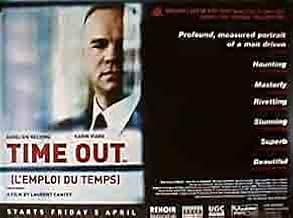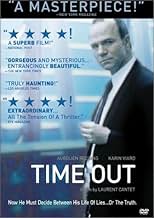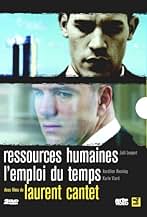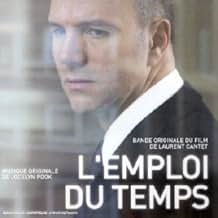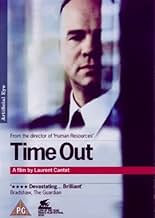PUNTUACIÓN EN IMDb
7,3/10
5,2 mil
TU PUNTUACIÓN
Añade un argumento en tu idiomaAn unemployed man finds his life sinking more and more into trouble as he hides his situation from his family and friends.An unemployed man finds his life sinking more and more into trouble as he hides his situation from his family and friends.An unemployed man finds his life sinking more and more into trouble as he hides his situation from his family and friends.
- Dirección
- Guión
- Reparto principal
- Premios
- 3 premios y 8 nominaciones en total
Didier Reyes
- Philippe
- (as Didier Perez)
Reseñas destacadas
10jotix100
"Time Out" seems to be the wrong translation for "L'emploi du temps". Laurent Cantet, the brilliant French director has given us a film that has a hypnotic quality and makes the viewer thinks. M. Cantet also wrote the material for the movie with Robin Campillo. This is, without a doubt, one of the most satisfying films coming from France in recent memory. As he proved with his "Human Resources", M. Cantet loves to present us stories in which characters are at the crossroads of their lives facing dilemmas related to things in the work environment.
If you haven't watched the film, perhaps you should like to stop reading now.
Vincent, the main character of "Time Out", is seen at the beginning of the film driving aimlessly through rural France, stopping at rest stops to sleep, buying things at roadside shops, or just idling around. When he calls his wife Muriel in his cell phone, we hear banal conversation between a married couple where the husband is calling home to check on his family. The only trouble is that Vincent is unemployed and he is reluctant to break the news to the family.
This man has a lovely wife, three normal children. His parents seem to have a good relationship with him. We see no sight of conflict. That is why so hard to understand what makes Vincent tick. Is it shame? Is it an ego thing? Is it his pride? Nothing seems to answer our questions because for all appearances, he is a normal person.
When Vincent hints about the possibility of a job in Geneva with the UN, his father, as well as the rest of the family believes him. Vincent witnesses a meeting in the UN building about the investment opportunities in Africa and how is that body going to be instrumental in helping the emerging economies. Suddenly, Vincent makes a plan to get some of his friends part with their savings by inventing a sure plan with incredible returns. In a way, it seems that people will be reluctant of schemes such as this one, but obviously, greed play a great deal in their minds and they give money to any charlatan. I know it first hand since I have a close friend that lost a lot of money this way, even though he understood about the risks involved.
Jean Michel, the mysterious man that happens to overhear Vincent pitching the idea to prospective investors, realizes the impossibility of the scheme. Vincent tells him about his plight and Jean Michel offers him a job helping him smuggle the counterfeit merchandise that makes a lot of money.
Unfortunately for liars, discovery is only a phone call away. Muriel finds out the truth and confronts Vincent about it. She tells her father in law, who has given an obscene amount of money to Vincent. When the father arrives at the house, Vincent flees into the night to the comforting highways that have become his best friends because they don't ask anything of him. Eventually, Vincent is seen calling Muriel from a roadside. She pleads with him to come home, but he refuses. The turmoil within his soul will not let him see the end of the tunnel. In his own mind, there is no solution for the problem he created.
The director hints to an easy solution for Vincent with an imminent suicide, but no. In the last sequence that ends the picture, we watch a Vincent dressed all in black being interviewed for a job that his father has been instrumental in securing for him. Are we seeing the truth, or are we seeing what the director has brilliantly done in order to get take us to a possibility that will register as the solution in our minds. The only thing is M. Cantet has left us clues about what really becomes of Vincent.
Aurelien Recoing, is a terrific actor. As times he reminds us of Kevin Spacey, and at times, he resembles a more ethereal James Gandolfini, but make no mistake, M. Recoing is an actor who captured the essence of the troubled Vincent. As Muriel, Karin Viard, is perfect. She gives a restrained performance. Also, Serge Livrozet, the kind Jean Michel, makes a wonderful appearance.
We await for the next work by the amazing Laurent Cantet.
If you haven't watched the film, perhaps you should like to stop reading now.
Vincent, the main character of "Time Out", is seen at the beginning of the film driving aimlessly through rural France, stopping at rest stops to sleep, buying things at roadside shops, or just idling around. When he calls his wife Muriel in his cell phone, we hear banal conversation between a married couple where the husband is calling home to check on his family. The only trouble is that Vincent is unemployed and he is reluctant to break the news to the family.
This man has a lovely wife, three normal children. His parents seem to have a good relationship with him. We see no sight of conflict. That is why so hard to understand what makes Vincent tick. Is it shame? Is it an ego thing? Is it his pride? Nothing seems to answer our questions because for all appearances, he is a normal person.
When Vincent hints about the possibility of a job in Geneva with the UN, his father, as well as the rest of the family believes him. Vincent witnesses a meeting in the UN building about the investment opportunities in Africa and how is that body going to be instrumental in helping the emerging economies. Suddenly, Vincent makes a plan to get some of his friends part with their savings by inventing a sure plan with incredible returns. In a way, it seems that people will be reluctant of schemes such as this one, but obviously, greed play a great deal in their minds and they give money to any charlatan. I know it first hand since I have a close friend that lost a lot of money this way, even though he understood about the risks involved.
Jean Michel, the mysterious man that happens to overhear Vincent pitching the idea to prospective investors, realizes the impossibility of the scheme. Vincent tells him about his plight and Jean Michel offers him a job helping him smuggle the counterfeit merchandise that makes a lot of money.
Unfortunately for liars, discovery is only a phone call away. Muriel finds out the truth and confronts Vincent about it. She tells her father in law, who has given an obscene amount of money to Vincent. When the father arrives at the house, Vincent flees into the night to the comforting highways that have become his best friends because they don't ask anything of him. Eventually, Vincent is seen calling Muriel from a roadside. She pleads with him to come home, but he refuses. The turmoil within his soul will not let him see the end of the tunnel. In his own mind, there is no solution for the problem he created.
The director hints to an easy solution for Vincent with an imminent suicide, but no. In the last sequence that ends the picture, we watch a Vincent dressed all in black being interviewed for a job that his father has been instrumental in securing for him. Are we seeing the truth, or are we seeing what the director has brilliantly done in order to get take us to a possibility that will register as the solution in our minds. The only thing is M. Cantet has left us clues about what really becomes of Vincent.
Aurelien Recoing, is a terrific actor. As times he reminds us of Kevin Spacey, and at times, he resembles a more ethereal James Gandolfini, but make no mistake, M. Recoing is an actor who captured the essence of the troubled Vincent. As Muriel, Karin Viard, is perfect. She gives a restrained performance. Also, Serge Livrozet, the kind Jean Michel, makes a wonderful appearance.
We await for the next work by the amazing Laurent Cantet.
People may lie for the thrill of being appreciated, or out of the fear of not being so; but while a fantasy world may initially seem liberating, it can become a prison as well. These themes are explored in 'Time Out', the story of Vincent, a man who loses his job and pretends he hasn't, rather than face up to the truth. There's a nice absence of didacticism in the way this film is assembled, a rich picture is assembled but without any attempt to ram a single interpretation down the audience's throat; it adds up to a fine portrait of depression, and a loneliness that oddly can exist only within a relationship. But there's also a creativeness in Vincent's behaviour which is necessary to generate the plot but which doesn't quite square with the rest of the movie: the film is more convincing once Vincent is deeply trapped in the web of his own lies, rather than when he is spinning it. At the heart of 'Time Out', Vincent remains an enigma unclarified: it is this that is both the film's strength and weakness. It's not a perfect film, and the start is quite dull, but the longer it lasts, the deeper it feels.
Playing authority figures in dark suits, the actor Stellan Skarsgard always suggests a noble melancholy, a weatherbeaten soul underneath his Swedish-oil-exec good looks. William H. Macy has made a career out of essaying the disappointments of pride-in-professionalism white men. Aurelien Recoing, the hero of Laurent Cantet's L'EMPLOI DU TEMPS, doesn't summon the instant empathy we feel for those actors. Cantet is a schematist in the style of Arthur Miller: without Miller's cornballs, but also without his visceral punch. Recoing's very body seems to be a manifestation of Cantet's two-sided patness. From the front, Recoing has some of the bland, boyish-haired handsomeness of a Skarsgard or a young Klaus Maria Brandauer. From the back, balding and bearlike-hulking, Recoing is a monster or a wreck. Cantet's movies--old-school, slowly downhill-rolling tragedies about the inhumanity of late capitalism--use Jekyll-and-Hyde dichotomies for thudding dramatic effects.
Recoing's Vincent has lost his job as a management consultant. Instead of getting another one, he drives around, hangs out in office-building lobbies and hotel bars, and generally dresses and comports like an upper-middle-class Frenchman. When he starts dreaming up a fantasy job--bringing bucks to developing markets in the Third World via the U.N.--he starts taking money from all-too-eager friends to invest. Then a middle-class mobster is onto Vincent's scheme. And from there...before you can say FARGO, the cards come tumblin' down.
Like Cantet's last movie, HUMAN RESOURCES, we are meant to hate the game, not the player, and to believe that a rigged, soulless system has robbed Cantet's characters of their capacity to experience joy on earth. But what does this character want, exactly? At one moment, he seems to genuinely wish he had the idealistic U.N. job--something, at his stage of life, with his background in the for-profit world, he could never attain. At other moments he seems to want to drive around the snowy countryside and listen to golden oldies. At still others, he seems to enjoy, a la Kevin Spacey in AMERICAN BEAUTY, the undemanding work of selling hot stereos and toasters for his mafia friend. And yet Cantet has designed the movie to make it seem as if the need for status, for patriarchal prestige, has led Vincent into the fantasy land that is his undoing. The ending--a softer landing than you might be expecting--is meant to be soul-chilling.
But what's the big whip? Everyone has dreamed of a life of aimless rambling; those who have it never seem very happy with it. (Cantet could've tested his ideas if he had bought Vincent a ticket to a lazybones' paradise.) And Cantet underlines the irony that Vincent's hustling to keep himself in non-work is in itself a more than full-time job. Cantet's movies struggle for a Miller-like inevitability, but they always fail to persuade on a human level; his crushed heroes seem more constructs than creatures. One brilliantly observant (and shudder-inducingly cruel) moment: Vincent's wife catches on to his ruse when he brings a buddy from the office to dinner--a pockmarked hustler who is too low-class to inhabit the highflown world Vincent pretends to have a berth in. The jig is up for Vincent because his wife's snob meter goes off. Too bad nothing else is as acutely examined or observant.
Recoing's Vincent has lost his job as a management consultant. Instead of getting another one, he drives around, hangs out in office-building lobbies and hotel bars, and generally dresses and comports like an upper-middle-class Frenchman. When he starts dreaming up a fantasy job--bringing bucks to developing markets in the Third World via the U.N.--he starts taking money from all-too-eager friends to invest. Then a middle-class mobster is onto Vincent's scheme. And from there...before you can say FARGO, the cards come tumblin' down.
Like Cantet's last movie, HUMAN RESOURCES, we are meant to hate the game, not the player, and to believe that a rigged, soulless system has robbed Cantet's characters of their capacity to experience joy on earth. But what does this character want, exactly? At one moment, he seems to genuinely wish he had the idealistic U.N. job--something, at his stage of life, with his background in the for-profit world, he could never attain. At other moments he seems to want to drive around the snowy countryside and listen to golden oldies. At still others, he seems to enjoy, a la Kevin Spacey in AMERICAN BEAUTY, the undemanding work of selling hot stereos and toasters for his mafia friend. And yet Cantet has designed the movie to make it seem as if the need for status, for patriarchal prestige, has led Vincent into the fantasy land that is his undoing. The ending--a softer landing than you might be expecting--is meant to be soul-chilling.
But what's the big whip? Everyone has dreamed of a life of aimless rambling; those who have it never seem very happy with it. (Cantet could've tested his ideas if he had bought Vincent a ticket to a lazybones' paradise.) And Cantet underlines the irony that Vincent's hustling to keep himself in non-work is in itself a more than full-time job. Cantet's movies struggle for a Miller-like inevitability, but they always fail to persuade on a human level; his crushed heroes seem more constructs than creatures. One brilliantly observant (and shudder-inducingly cruel) moment: Vincent's wife catches on to his ruse when he brings a buddy from the office to dinner--a pockmarked hustler who is too low-class to inhabit the highflown world Vincent pretends to have a berth in. The jig is up for Vincent because his wife's snob meter goes off. Too bad nothing else is as acutely examined or observant.
This is a purely awesome film, the best of Laurent Cantet, the movie that reavealed him, and the best role ever from Aurélien Recoing. This is inspired from actual events,a nd this very same story was remade one year later with Daniel Auteuil: L'ADVERSAIRE. Both are terrific but not sjown in the same manner. The 2002 film from Nicole Garcia was more criminal oriented. Here, you are glued, stuck to this riveting tale. You always wonder what will happen in the next scene. An outstanding drama, involving normal folks to whom happens something really terrible. Top of the top. One of the best dramas ever. Serge Livrozet, this non professional actor, gives here a jaw dropping short but unique performance. The amazing story of a man more and more prisoner of his own lies.
A middle-aged middle class family man has a mid-life crisis.
Hardly an inspiring or original idea, yet Laurent Cantet creates a quite devastating and compelling landscape of one man's internal terror - terror at his situation and complete inability to express his feelings.
Through Cantet, a combination of economic script, astonishingly sparse and subtle performances, and Pook's deeply moving musical score, takes the viewer on a journey of displaced despair and futile attempts to paper over the cracks. Recoing is captivating, his face a turmoil of quiet bewilderment and pain, and he is ably matched by Viard as his increasingly unsettled partner. The penultimate scene between Recoing, Viard and their children is quite astonishing for its tension and disquiet.
In the end, however, the final scene says it all. Recoing's face tells us everything we need to know, and he really should have won every award going for this brilliant performance. Once again the French film industry shows us all how to make films.
Hardly an inspiring or original idea, yet Laurent Cantet creates a quite devastating and compelling landscape of one man's internal terror - terror at his situation and complete inability to express his feelings.
Through Cantet, a combination of economic script, astonishingly sparse and subtle performances, and Pook's deeply moving musical score, takes the viewer on a journey of displaced despair and futile attempts to paper over the cracks. Recoing is captivating, his face a turmoil of quiet bewilderment and pain, and he is ably matched by Viard as his increasingly unsettled partner. The penultimate scene between Recoing, Viard and their children is quite astonishing for its tension and disquiet.
In the end, however, the final scene says it all. Recoing's face tells us everything we need to know, and he really should have won every award going for this brilliant performance. Once again the French film industry shows us all how to make films.
¿Sabías que...?
- CuriosidadesInspired by a true story, that of Jean-Claude Romand. In reality, Romand went on to kill, on January 9, 1993, his wife, two children and both his parents. It is the first of three films in two years inspired by the case, followed by El adversario (2002) and La vida de nadie (2002), of which the former is the closest to the real events. Phantom (2002) was also inspired by the same incident.
- ConexionesFeatured in The 2003 IFP Independent Spirit Awards (2003)
- Banda sonoraL'Emploi Du Temps - Musique Originale
Composed by/ Arranged By Jocelyn Pook
Performed by 'Electra Strings' Ensemble
Cello Solo performed by Sophie Harris
Viola Solo performed by Clive Howard
Violin solo performed by Jacqueline Norrie
Phonographic Copyright (p) Jocelyn Pook / Haut et Court
Under Exclusive License To Virgin France
Published By Chester Music Ltd.
© 2001 Virgin France
Selecciones populares
Inicia sesión para calificar y añadir a tu lista para recibir recomendaciones personalizadas
- How long is Time Out?Con tecnología de Alexa
Detalles
Taquilla
- Recaudación en Estados Unidos y Canadá
- 448.542 US$
- Recaudación en todo el mundo
- 1.213.913 US$
- Duración
- 2h 14min(134 min)
- Color
- Mezcla de sonido
- Relación de aspecto
- 1.85 : 1
Contribuir a esta página
Sugerir un cambio o añadir el contenido que falta




